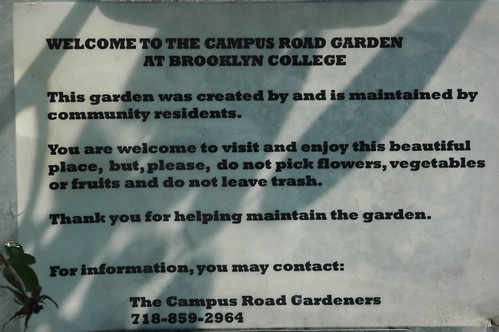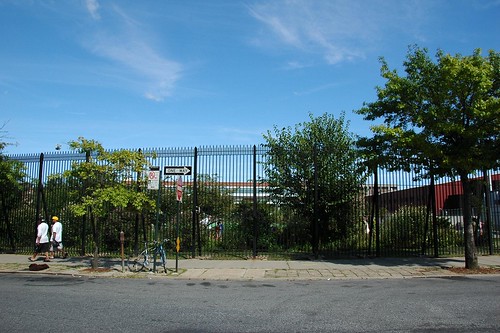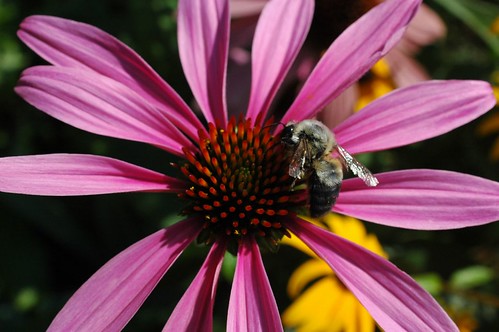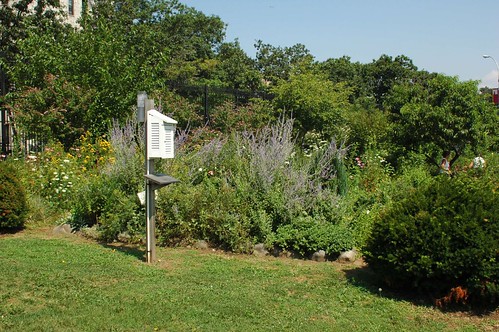What happens when you get 1 Brooklyn College + extra land x neighbors who care about the environment? A Brooklyn College community garden! Or rather, the Campus Road Community Garden.

The Campus Road Community Garden was founded in 1997, under the auspices of the South Midwood Residents Association (SMRA), according to the Daily News. The agreement to build the garden was negotiated between the then-current President of Brooklyn College and Ms. Toby Sanchez. The plot’s location was considered provisional — it would be moved to a more permanent location when the college had more money.
As the years passed, the college left the garden alone. It grew slowly, about two or three thousand square feet more than its original 6000 feet, and now encompasses about forty members. Growers, who pay $30 a year for a plot, raise vegetables, flowers, and herbs. The garden hosts collaborative learning experiences for high school students, and this past September, hosted a Brooklyn College Slow Food eat-in.

But the Campus Road Community Garden is now in danger. Brooklyn College has awoken from its green-dreams slumber and discovered that, in order to broaden its running track, it must cut into its parking lot. How to create more parking spots to compensate for the old ones taken down? Why of course — demolish the Campus Road Community Garden!
I had the privilege of speaking to Madeline Nelson, a community-oriented activist and a staunch supporter of all the Campus Road Community Garden symbolizes, about the situation. She read me excerpts of the original contract – and some of the requirements are so unusual, I have to share them. Did you know that the gardeners must leave plots for academic programs, and if Brooklyn College’s president wants flowers from the garden, the growers are required to give some?
She also shared with me the growers’ response to Brooklyn College’s claim that the gardeners have extended their boundaries beyond what the contract permitted. Madeline pointed out that the contract never specified borders for the garden’s northern and southern sides; only the eastern and western sides had specifications, and to ensure the garden kept within those boundaries, a pathway was built in the spring of 1997. In any case, Madeline explained, the garden expanded slowly, and Brooklyn College was aware of every foot the garden grew. The growers never attempted to hide the gradual plot-by-plot expansion, and besides, Brooklyn College received an annual list participants – they were fully aware of when more people where added to the garden’s roster.
I asked Madeline if she could explain Brooklyn College’s affirmation that the garden’s current location was always considered provisional, and growers thus could not protest when the college announced the garden would be moved.
She explained that it was “verbally understood” that the garden was on a ten-year plan, and eventually something was going to be done so the school could expand its athletic field. But, she went on to say, the gardeners understood that the expansion would be for academic purposes – for the students to have a better athletic area. But not for a parking lot!

Brooklyn College’s official stance on the creation of a new parking lot is that they are legally required to add more spots to make up for those lost to the new athletic field – a question of state law. The growers, however, question this sudden need for more parking. Mass transportation and the recent surge of bike-riding have lessened the need for parking. And, if it is indeed a matter of state law, Madeline asked me, has Brooklyn College done its “due diligence”? Has the college asked the state for an exemption? Have they explained times have changed – that with more buses, bicycles, and trains, the parking lot just isn’t necessary?
Madeline also outlined several of the gardeners’ own proposals, all of which would protect the garden while still getting the parking that Brooklyn College insists it needs.
First, there is the massive Target parking lot right next to the university, which never seems to be at anywhere near full capacity – a “hugely underutilized” facility, Madeline calls it. As it is, Target offers special rates for those who come to park early, but has the college ever attempted to negotiate a special student lot in Target’s parking area? Target would get more potential consumers, and Brooklyn College would have a place to which they can send students’ cars.
If Target will not cooperate – and we don’t know if they won’t, because the college has not taken up the proposal – Madeline pointed out that by the new West Quad Building, there is more empty land, full of trees and shrubs that are not as developed at the ones in the garden. She actually suggested to Brooklyn College personnel that the athletic track be expanded there, and then the parking be put elsewhere, but the response was negative: “Nice idea, ain’t gonna happen.”

But it gets worse. In the new garden, Brooklyn College wants a new organizer – instead of the current one, who is part of the community and has over sixteen years of experience in the garden, the college wants to put in a faculty coordinator. What does a teacher from the college know about a garden that someone who actually works in the garden does not? Furthermore, the garden would also fall under the jurisdiction of Brooklyn College Facilities Planning and Operations – the very same Facilities whose Assistant Vice President, Steve Czirak, called the garden a “weed patch”!
What has gone wrong? How can Brooklyn College sacrifice this working ecosystem, as Madeline calls it, for a parking lot? Where has the college failed?
What Brooklyn College has failed to see is that the community garden has done just that – created a community. Growers, nature lovers, and curious students all bond over the patch of greenery; people find new roles as planters, as admirers, and as eaters. The community garden has taken what we all know – that food must be grown before it can be eaten – and made it something we understand. But by dismantling years of devotion, sweat, and hard work, Brooklyn College is refusing to see just how valuable the community garden is – something so much more meaningful than fifty parking spots!

The gardeners are not taking this sitting down, and neither must you. Destroying a valuable piece of local culture — not to mention a haven for flora and fauna in the veritable desert that is the college — to build more parking spots is the ultimate in cruel ironies. And you can help! From the comfort of your own home, sign an electronic petition here, and join the Facebook group devoted to the garden here. Interested in taking a more active role? On Wednesday, February 24, 2010, Community Board 14 (at the CB14 District Office, 810 E 16th Street) is holding a meeting at 7 PM – and the life of the community garden is the hot topic of the night. So show your face, and your support, and let Brooklyn College know that a garden is a thing of beauty – and should be enjoyed, if not forever, for at least many years to come.
All photos courtesy of Flatbush Gardener. Thanks to Madeline Nelson for graciously giving her time and allowing me to interview her for this piece.